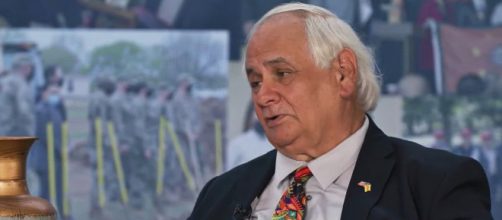The White House has announced that U.S. President Joe Biden would give the Medal of Honor to Dwight Birdwell, a former chief justice of the Cherokee Nation Supreme Court, on July 5.
The White House said Biden would also present the medal to two other U.S. Army Vietnam veterans. In addition, the Medal of Honor would be given to one soldier posthumously, the June 27 announcement said.
'Acts of gallantry and intrepidity'
Birdwell was receiving the medal for "acts of gallantry and intrepidity above and beyond the call of duty" carried out in South Vietnam on January 31, 1968, the White House said.
The announcement recalled that Birdwell had been a specialist 5th class with Troop C, 3rd Squadron, 4th Cavalry, 25th Infantry Division when his unit had been attacked at an airbase near Saigon.
After moving his incapacitated tank commander to safety, he had turned the tank's guns on the attackers, the White House said. It noted that Birdwell had eventually left the tank and had kept on fighting until being shot in the face and torso. Even then, he had turned down a chance to evacuate and had gone on to hamper the enemy assault until the arrival of support, the White House recalled
Only after being ordered to get his wounds treated had Birdwell stopped helping evacuate his wounded camarades, the announcement said.
It noted that Birdwell had been honorably discharged later in 1968 and was currently a lawyer in Oklahoma City. The entire announcement can be read at the White House website.
'A true Cherokee patriot'
The Cherokee Nation, the largest tribal government in the United States, congratulated Birdwell for winning the medal in a series of posts on Twitter.
The tribal government noted that Birdwell had served as the Chief Justice of the Cherokee Nation Supreme Court.
One post quoted Cherokee Chief Chuck Hoskin calling Birdwell "a true Cherokee patriot who put his own life at risk without hesitation and expected no commendation."
1) Congratulations to Cherokee Nation citizen Dwight Birdwell, who previously served on the Cherokee Nation Supreme Court as Chief Justice. Mr. Birdwell is one of only a handful of Cherokees to receive the Medal of Honor.https://t.co/qp5TYqmhEg
— Cherokee Nation (@CherokeeNation) June 28, 2022Vietnam was 'an overwhelming experience'
Earlier this year, the Cherokee Nation posted a video of some of the tribe's veterans on its YouTube channel.
In the video, Birdwell said his service in Vietnam had been "an overwhelming experience" and adapting to life as a college student in the U.S. had not been easy.
"Often I would be sitting in class, but my mind was in Vietnam," he said. "I knew I had to listen to professors or I wasn't going to pass, so that's where I adopted my one-day-at-a-time philosophy and it worked just great."
Biden would also award the Medal of Honor to Specialist 5th Class Dennis Fujii for his acts of heroism as chief of a helicopter ambulance crew in February 1971, the White Houe said. While attempting to rescue wounded South Vietnamese soldiers, Fujii's helicopter had been struck by enemy fire and then crash landed, the White House announcement said.
'The only American on the battlefield'
Despite being injured, Fujii had refused to be evacuated and stayed "as the only American on the battlefield," giving first aid to Vietnamese forces, the statement recalled. Eventually he had asked for American helicopter gunships to help fend off the enemy, it added. Fujii had continually exposed himself to enemy fire for over 17 hours in order to accurately identify enemy troop locations and to direct air strikes until being airlifted from the area, the White House recalled. It noted that Fujii was currently a resident of Hawaii.
The White House said Major John Duffy would also receive the Medal of Honor for acts of heroism on April 14 and 15, 1972 when he had been senior advisor to an airborne battalion of the South Vietnamese army.
Before the events of April 14, the enemy had killed the commander of Duffy's battalion, destroyed the battalion command post and wounded Duffy twice, but he had turned down the chance for evacuation, the White House statement said. It added that on April 14, Duffy had once more been wounded and had once more refused to be evacuated after having approached enemy anti-aircraft positions in order to call in air strikes.
That afternoon, in the face of an enemy ground assault from all directions, Duffy had moved about, adjusting fire, spotting targets for artillery and directing gunship fire, the White House said. It recalled that the next day, after an enemy ambush, he had led an evacuation. Duffy would eventually retire from the army in May 1977 and become a resident of Santa Cruz, California, the statement added.
The Medal of Honor was going to be posthumously awarded to Staff Sergeant Edward Kaneshiro for heroism displayed on December 1, 1966, the White House said. On that day, while in a village on a search and destroy mission, Kaneshiro and his team had come under attack by North Vietnamese forces, the announcement said. It added that, by eliminating one group of the enemy group with gunfire and two other groups with grenades, Kaneshiro had made it possible for his team to withdraw from the area, the White House said. It added that Kaneshiro would later be killed by enemy gunfire on March 6, 1967.


